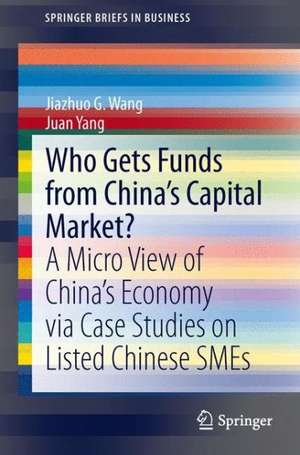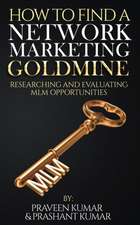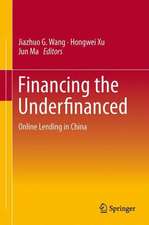Who Gets Funds from China’s Capital Market?: A Micro View of China’s Economy via Case Studies on Listed Chinese SMEs: SpringerBriefs in Business
Autor Jiazhuo G. Wang, Juan Yangen Limba Engleză Paperback – 23 ian 2014
In addition, this book provides a nuanced and micro view of the Chinese economy. As China’s economy increasingly receives attention worldwide, the amount of research and publications on China’s economy is also growing exponentially. However, the majority of these studies only focus on the macro level of the Chinese economy and aggregate variables such as GDP, growth rate, inflation, etc., while little research has been done at a micro and company level to analyze the Chinese economy. Thus, this book’s focus on the case studies of representative firms may help fill some gaps in the study of business and the economy in China.
Furthermore, this book hopes to dispel certain misconceptions about the nature of the Chinese economy. There is currently a stereotypical view about Chinese economy, for example that China, as the workshop of the world, primarily produces low-end products with low prices to be sold in other countries by budget retailers like Wal-Mart or dollar stores. While that is true to some extent, it is certainly not the whole story. The companies analyzed in this bookcover a wide spectrum of industries including modern agriculture, alternative energy, resources recycling, mobile games, animation, luxury products, supply chain management, filmmaking and TV series production, displaying to readers the brand-new industrial structure of Chinese companies in the 21st century.
Din seria SpringerBriefs in Business
-
 Preț: 262.86 lei
Preț: 262.86 lei -
 Preț: 382.75 lei
Preț: 382.75 lei -
 Preț: 410.39 lei
Preț: 410.39 lei -
 Preț: 342.74 lei
Preț: 342.74 lei -
 Preț: 380.25 lei
Preț: 380.25 lei -
 Preț: 414.21 lei
Preț: 414.21 lei -
 Preț: 476.95 lei
Preț: 476.95 lei -
 Preț: 341.97 lei
Preț: 341.97 lei -
 Preț: 385.84 lei
Preț: 385.84 lei -
 Preț: 345.45 lei
Preț: 345.45 lei -
 Preț: 343.97 lei
Preț: 343.97 lei -
 Preț: 343.98 lei
Preț: 343.98 lei -
 Preț: 378.54 lei
Preț: 378.54 lei -
 Preț: 375.45 lei
Preț: 375.45 lei -
 Preț: 443.75 lei
Preț: 443.75 lei -
 Preț: 444.74 lei
Preț: 444.74 lei -
 Preț: 476.03 lei
Preț: 476.03 lei -
 Preț: 379.48 lei
Preț: 379.48 lei -
 Preț: 340.83 lei
Preț: 340.83 lei -
 Preț: 377.18 lei
Preț: 377.18 lei -
 Preț: 345.50 lei
Preț: 345.50 lei -
 Preț: 378.12 lei
Preț: 378.12 lei -
 Preț: 376.43 lei
Preț: 376.43 lei -
 Preț: 376.59 lei
Preț: 376.59 lei -
 Preț: 374.85 lei
Preț: 374.85 lei -
 Preț: 346.86 lei
Preț: 346.86 lei -
 Preț: 341.64 lei
Preț: 341.64 lei -
 Preț: 341.75 lei
Preț: 341.75 lei -
 Preț: 344.14 lei
Preț: 344.14 lei -
 Preț: 377.18 lei
Preț: 377.18 lei -
 Preț: 377.95 lei
Preț: 377.95 lei -
 Preț: 343.72 lei
Preț: 343.72 lei -
 Preț: 374.08 lei
Preț: 374.08 lei -
 Preț: 375.23 lei
Preț: 375.23 lei -
 Preț: 375.62 lei
Preț: 375.62 lei -
 Preț: 376.43 lei
Preț: 376.43 lei -
 Preț: 377.73 lei
Preț: 377.73 lei -
 Preț: 376.22 lei
Preț: 376.22 lei -
 Preț: 347.31 lei
Preț: 347.31 lei -
 Preț: 376.59 lei
Preț: 376.59 lei -
 Preț: 376.22 lei
Preț: 376.22 lei -
 Preț: 343.72 lei
Preț: 343.72 lei -
 Preț: 383.12 lei
Preț: 383.12 lei -
 Preț: 376.22 lei
Preț: 376.22 lei -
 Preț: 376.22 lei
Preț: 376.22 lei -
 Preț: 342.74 lei
Preț: 342.74 lei -
 Preț: 377.73 lei
Preț: 377.73 lei -
 Preț: 379.09 lei
Preț: 379.09 lei -
 Preț: 377.18 lei
Preț: 377.18 lei
Preț: 380.25 lei
Nou
Puncte Express: 570
Preț estimativ în valută:
72.76€ • 76.17$ • 60.20£
72.76€ • 76.17$ • 60.20£
Carte tipărită la comandă
Livrare economică 05-19 aprilie
Preluare comenzi: 021 569.72.76
Specificații
ISBN-13: 9783642449123
ISBN-10: 3642449123
Pagini: 125
Ilustrații: XVIII, 139 p. 12 illus.
Dimensiuni: 155 x 235 x 17 mm
Greutate: 0.23 kg
Ediția:2013
Editura: Springer Berlin, Heidelberg
Colecția Springer
Seria SpringerBriefs in Business
Locul publicării:Berlin, Heidelberg, Germany
ISBN-10: 3642449123
Pagini: 125
Ilustrații: XVIII, 139 p. 12 illus.
Dimensiuni: 155 x 235 x 17 mm
Greutate: 0.23 kg
Ediția:2013
Editura: Springer Berlin, Heidelberg
Colecția Springer
Seria SpringerBriefs in Business
Locul publicării:Berlin, Heidelberg, Germany
Public țintă
ResearchCuprins
Preface.- Acknowledgment.- SME and SME Board of China’s Capital Market.- What Can Batteries Power?.- A Leading Miner in "Urban Mining".- A Pioneer: Moving towards New Agriculture.- The King of Mobile Game.- You Only Need to Dial One Number.- The Bird of the First Light.- Has the Era of “Designed in China” Finally Come?.- China’s Warner Brothers?.- A Paver of Unique Ways.- The Window of China’s New Economy.
Textul de pe ultima copertă
The subject of this book is an analysis of the business models developed or adopted by Chinese small and medium sized enterprises (SMEs), specifically those that are successfully listed on China’s capital market; in other words, it is a dissection of those Chinese business models that have “worked.” In China, there are over 10 million companies that are registered with China’s State Industrial and Commercial Administration, and over 40 million unregistered businesses. Among them, only about 1,000 companies became successfully listed on China’s capital market and were able to obtain public funds from equity investors. This book takes a look at who these “lucky ones” were, and what business models led to their success in a highly competitive Chinese market, investigations that will certainly be of interest to both Chinese and international readerships.
In addition, this book provides a nuanced and micro view of the Chinese economy. As China’s economy increasingly receives attention worldwide, the amount of research and publications on China’s economy is also growing exponentially. However, the majority of these studies only focus on the macro level of the Chinese economy and aggregate variables such as GDP, growth rate, inflation, etc., while little research has been done at a micro and company level to analyze the Chinese economy. Thus, this book’s focus on the case studies of representative firms may help fill some gaps in the study of business and the economy in China.
Furthermore, this book hopes to dispel certain misconceptions about the nature of the Chinese economy. There is currently a stereotypical view about Chinese economy, for example, that China, as the workshop of the world, primarily produces low-end products with low prices to be sold in other countries by budget retailers like Wal-Mart or dollar stores. While that is true to some extent, it is certainly not the whole story. The companies analyzed in this book covera wide spectrum of industries including modern agriculture, alternative energy, resources recycling, mobile games, animation, luxury products, supply chain management, filmmaking and TV series production, displaying to readers the brand-new industrial structure of Chinese companies in the 21st century.
In addition, this book provides a nuanced and micro view of the Chinese economy. As China’s economy increasingly receives attention worldwide, the amount of research and publications on China’s economy is also growing exponentially. However, the majority of these studies only focus on the macro level of the Chinese economy and aggregate variables such as GDP, growth rate, inflation, etc., while little research has been done at a micro and company level to analyze the Chinese economy. Thus, this book’s focus on the case studies of representative firms may help fill some gaps in the study of business and the economy in China.
Furthermore, this book hopes to dispel certain misconceptions about the nature of the Chinese economy. There is currently a stereotypical view about Chinese economy, for example, that China, as the workshop of the world, primarily produces low-end products with low prices to be sold in other countries by budget retailers like Wal-Mart or dollar stores. While that is true to some extent, it is certainly not the whole story. The companies analyzed in this book covera wide spectrum of industries including modern agriculture, alternative energy, resources recycling, mobile games, animation, luxury products, supply chain management, filmmaking and TV series production, displaying to readers the brand-new industrial structure of Chinese companies in the 21st century.
Caracteristici
Offers a nuanced, micro view of the Chinese economy Examines in depth the business models that succeeded in a highly competitive Chinese market Gives readers an understanding of the emerging industries that represent the future of the Chinese economy from the 21st century onwards Includes supplementary material: sn.pub/extras





















